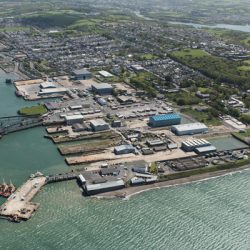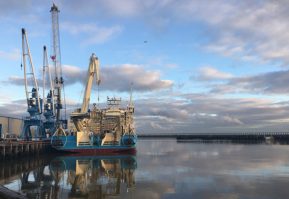Harbouring great ambitions

The past three years have been interesting for the ports industry, to say the least. Thrust on to the front pages and news bulletins on a regular basis, we have welcomed, in part, the increased profile and discussion of the importance of our industry to the wider economy. Rarely have experts – and non-experts – in trade, customs and border procedures found their opinions in such demand from journalists and others. The result, for better or for worse, is that in pubs and cafes around the UK, conversations on the World Trade Organisation, the consequences of tariffs, and the rules of origin are regularly taking place.
The view of the British Ports Association has remained relatively straightforward and consistent since the referendum three years ago. We represent over 350 varying types of ports across the whole of the UK and believe that whatever long-term relationship the UK seeks with the EU, the withdrawal must be orderly, and we must seek to protect the “frictionless trade” that we have enjoyed for decades inside the EU.
Looking into our crystal ball now, it looks like the Brexit Groundhog Day of the last three years is set to continue, as negotiations on our long-term relationship with the EU have barely begun. We would like to see the UK and EU eventually agree a long-term trading arrangement that protects the UK’s free-flowing trade with the continent – at the moment you can drive a lorry load of goods from Belfast through Dublin, Holyhead, Dover, Calais and on to Berlin, Rome or Athens with minimal fuss. Introducing barriers into this process will be to the detriment of businesses and consumers alike, and our logistics sector would need time to adjust.
We are confident that this message is being heard loud and clear in Whitehall and Brussels. A long-term agreement is now in the hands of political leaders and we hope that the uncertainty and games of recent months can be put behind us. We are keen to move on and see our world-class industry in the news for better reasons.
Maintaining world-class performance
As well as employing over 100,000 people in the UK, our seaports handle 95% of all UK trade. It is likely that the paper, monitor or smartphone you are reading this on was imported into the UK in a lorry, container or ship of one form or another. A quarter of our energy and half of our food is driven, lifted or pumped over a quayside before arriving in our homes and businesses. Ports are the foundation not only of the UK’s thriving Blue Economy – supporting leisure marine activities to offshore renewables – but for the wider economy, welcoming the thousands of cargo ships that keep the economy moving. Whilst Brexit is a priority for us, we have not lost sight of the wider issues. As long as the people in the UK and beyond continue to buy food, clothes and cars, ports will continue to handle the movement of goods (and people). But whilst this is an ancient business, it takes constant renewal.
For decades our ports have invested billions of commercial capital into infrastructure and innovation to ensure that our harbours are run in an increasingly efficient manner, helping keep prices in the shops lower for everyone. The result is world-class ports that outperform the OECD average in terms of infrastructure quality and efficiency. This is not a surprise to many, given our proud maritime heritage. With one of the longest coastlines in the world – longer than India’s – but a relatively small landmass, the UK is well placed to build on this position and become a maritime industrial powerhouse.
The ports industry therefore was pleased to welcome the UK Government’s recent Maritime 2050 strategy, an ambitious and wide-ranging plan for the wider sector over the next thirty years. It will set out a series of roadmaps for how ministers can support the next generation of investment and innovation across the industry.
The ports industry is putting forward its own proposals this year alongside this strategy for what we see as an opportunity for the government to make a step change in the way its policies support the sector.

We are pleased that “free ports” are being discussed at the highest levels of government as a way of boosting economic activity in and around ports. These are free-trade zones around ports: essentially secure areas that sit outside the UK’s customs territory. The idea is often aimed at ports that handle raw materials or oil that can be processed, and value added before being reexported, or imported. It could be a significant boost for manufacturing and coastal areas that have suffered economically in the post-war era.
We have been exploring this idea and would like to see them expanded to incorporate wider ideas around improving marine development in ports. Despite covering less than 1% of the UK’s coastline, 80% of harbour areas are covered by strict environmental conservation areas that make development difficult and expensive. Ports are industrial areas that are critical to the economy and food and energy security of the UK.
Many of the UK’s environmental rules are currently set by the EU, but few European countries comply with the same level of vigour as the UK, and few would consider placing environmental designations over existing major port developments. Out of the uncertainty of the last few years, we now see a huge opportunity to recast policies to support our burgeoning Blue Economy in a way that is both environmentally and economically sustainable. This is not an easy challenge but one we must grasp if we are to realise the ambitions contained in Maritime 2050 and harboured by the entire maritime sector.
Further information
For more supply chain news, follow The European


